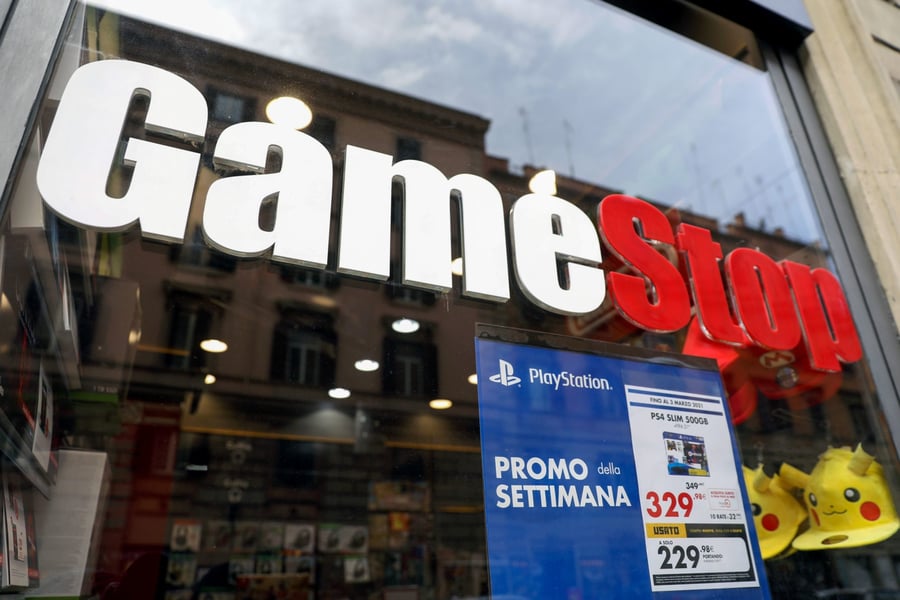

The pandemonium over GameStop Corp.’s stock surge this week and subsequent media frenzy has spurred a handful of online brokerages — including Robinhood, TD Ameritrade and Interactive Brokers Group — to place restrictions on trading particular stocks like GameStop, AMC and other shorted stocks.
All three trading platforms issued statements on Thursday acknowledging the unprecedented trading volume that occurred this week after social media posts on Reddit and from prominent CEOs and internet influencers created a surge in GameStop stock and ultimately pushed the video game retail business to a $24 billion market cap by end of day Wednesday.
TD Ameritrade, for one, says it has not halted trading in any securities, but has placed restrictions on some transactions, according to a company spokeswoman. “It is not uncommon for us to make such decisions, which we consider on an individual basis, in the interest of mitigating risk,” the spokeswoman wrote in an email.
TD Ameritrade has been adjusting its requirements for several days as the broker-dealer continued to see trends indicating unusual volume in an unprecedented market environment, which appear at odds with traditional market fundamentals, according to the company spokeswoman. “We have made what we believe to be prudent and appropriate decisions to place some limits on certain transactions for certain securities,” she wrote.
Interactive Brokers Group, a global brokerage firm, also announced that as of midday Wednesday, it has put options trading into liquidation due to the extraordinary volatility in the markets for holdings in AMC Entertainment Holdings Inc., BlackBerry Ltd., Express, Inc., GameStop Corp. and Koss Corporation, according to a company announcement.
In addition, long stock positions will require 100% margin and short stock positions will require 300% margin until further notice, according to the announcement. “We do not believe this situation will subside until the exchanges and regulators halt or put certain symbols into liquidation only," according to the announcement. "We will continue to monitor market conditions and may add or remove symbols as may be warranted.”
Free trading app Robinhood said in a blog post that it has also restricted transactions for certain securities. One Robinhood user told InvestmentNews she was unable to access GameStop, Nokia and other stocks because the app would not return results for those stock during a standard search on its mobile app.
The announcement also attracted attention from lawmakers seeing the move as “unacceptable,” Rep. Alexandria Ocasio-Cortez, D-N.Y., said via her Twitter on Thursday.
Tesla CEO Elon Musk, who is largely credited with instigating the GameStop trading frenzy, responded directly to the tweet, replying with a single word: “Absolutely.”
Sen. Ted Cruz, R-Texas, concurred, writing "Fully agree," via Twitter.
As lawmakers sort out their positions on the matter, the restrictions by companies on clients’ ability to buy or sell specific stocks could be seen as a dangerous precedent to start picking what stocks are volatile, or not, said Bob Cortright, CEO at DriveWealth.
“The core issue is that [these platforms] never got around to enforcing suitability rules around options [trading] and letting people speculate on options,” he said. “This has fueled the gambling mentality.”
Now, there is the issue of stock manipulation, Cortright said. “Regulators will start to pay attention to some of these sites (Reddit, TikTok, Twitter, etc.) about who can say things and if you're registered to say things,” he said. “But that's going to be a really difficult thing to accomplish because like with everything else, people jump from site to site and they keep looking for a venue.”
Seattle-based financial planner Michael Policar agreed, via Twitter, that the trading platform restrictions set a bad precedent for the overall trading culture. “I thought every transaction had to have a buyer and a seller? But now one side is being told they can't take the side of the trade that they want,” he wrote.
The problem is largely self-made as a result of e-brokers providing access to free trading, said Tim Welsh, president of Nexus Strategy.
“In order to provide zero commissions, the e-brokers needed to rely on payment for order flow arrangements from institutional traders and hedge funds,” Welsh said. “The underlying assumption is that those institutions are willing to pay for retail order flow because those trades represent ‘dumb’ or ‘uninformed’ money and they can use that information to trade against to profit for themselves.”
If there wasn’t value in that order flow for them, they would never pay for it, Welsh said. To that end, when the retail order flow contains toxic trades like GameStop, then that order flow is no longer predictable, nor safe to trade against.
As a result, the e-brokers have to listen to their payment-for-order-flow buyers and remove those toxic names from the flow, or the whole zero commission model falls apart, according to Welsh.
“The e-brokers are not being benevolent, or protecting investors from themselves — they are doing for their own survival and to maintain the status quo of PFOF and free trading. This is a bad precedent they are setting. As we know, free is never free,” he said.

The SEC hailed the verdict against the investment advisor, who the agency said breached his fiduciary duty to retired and pre-retiree clients.

As Robinhood bets on prediction markets, advisors are skeptical of the app's push into the RIA custody and wealth management services.

Wealth arm thrives despite market headwinds.

Markets digest latest words on trade war, Fed chair’s position.

More advisors are using subscription models for financial planning services.
RIAs face rising regulatory pressure in 2025. Forward-looking firms are responding with embedded technology, not more paperwork.
As inheritances are set to reshape client portfolios and next-gen heirs demand digital-first experiences, firms are retooling their wealth tech stacks and succession models in real time.
